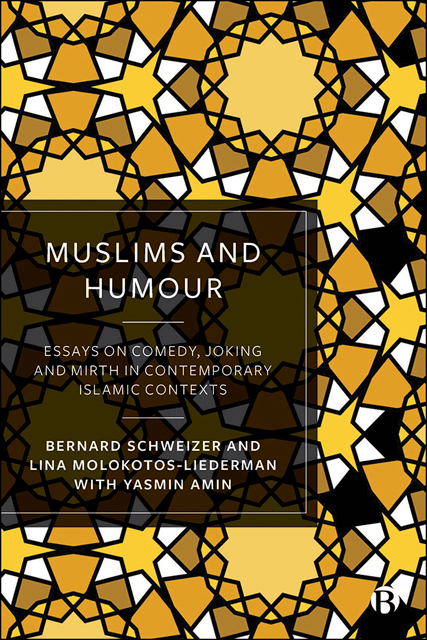Book contents
- Frontmatter
- Contents
- Notes on Contributors
- Acknowledgements
- Introduction
- Part I Theoretical Perspectives on Islam and Humour
- Part II Muslim Humour Practices in Islamicate Societies: Textual Media
- Part III Muslim Humour Practices in Islamicate Societies: Visual Media and Performance
- Part IV Muslim Comedy in North America
- Conclusion
- Bibliography on Islam and Humour
- Index
1 - Ridicule in the Qur’an: The Missing Link in Islamic Humour Studies
Published online by Cambridge University Press: 13 October 2022
- Frontmatter
- Contents
- Notes on Contributors
- Acknowledgements
- Introduction
- Part I Theoretical Perspectives on Islam and Humour
- Part II Muslim Humour Practices in Islamicate Societies: Textual Media
- Part III Muslim Humour Practices in Islamicate Societies: Visual Media and Performance
- Part IV Muslim Comedy in North America
- Conclusion
- Bibliography on Islam and Humour
- Index
Summary
Introduction: The missing link in Islamic humour Studies
As I was finishing the writing of this chapter, some news caught my attention: ‘Charlie Hebdo: Magazine republishes controversial Mohammed cartoons’ (Anon., 2020). The decision came a day before the trial of some of the perpetrators of the 2015 deadly attack on the satirical weekly. The news prompted various reactions, including threats on the magazine by al-Qaeda (Express Web Desk, 2020). One especially hopeful response, however, came from Mohammed Moussaoui, president of the French Council of Muslim Worship (CFCM), who urged Muslims to ‘ignore’ the cartoons, while condemning any violence. He said, ‘The freedom to caricature is guaranteed for all, the freedom to love or not to love (the caricatures) as well. Nothing can justify violence’ (Pouchot and Williams, 2020). If anything, I hope the present chapter – a contextualist rereading of ridicule in the Qur’an, its role in the early Islamic era, and its relevance to today's debates on the connection between Islam and (ridiculing) humour – shows how, in the face of previous violence against satires of Islam, Moussaoui's attitude can be theologically defended. (As this chapter concludes, I do not imply Moussaoui's reaction to be the only possible non-violent response to such satire. The right to critique such satire, including for political reasons, should remain acknowledged, if not also encouraged, especially for minority Muslim populations subjected to such satire.) I hope to achieve this goal not only based on a historical reinterpretation of ridicule in the Qur’an, but also according to a reconsideration of the Qur’anic attitude toward disbelievers’ mockery of Islam, God, and/or Prophet Muḥammad. Specifically, I argue that unlike what is prevalently understood in theological debates on the matter, the Qur’an's special attention to disbelievers’ ridiculing of Islam and the Islamic is apparently not indicative of any universal moral creeds; instead, it signifies a historical problematic that could be more completely grasped if we considered the early Islamic era context. Moreover, even if assumed to reflect a universal matter, the Qur’an's numerous unappreciative references to disbelievers’ mockery are, as explicitly noted in the scripture itself, reserved for retaliation only by God in the afterlife, and not by humans.
- Type
- Chapter
- Information
- Muslims and HumourEssays on Comedy, Joking, and Mirth in Contemporary Islamic Contexts, pp. 19 - 43Publisher: Bristol University PressPrint publication year: 2022

